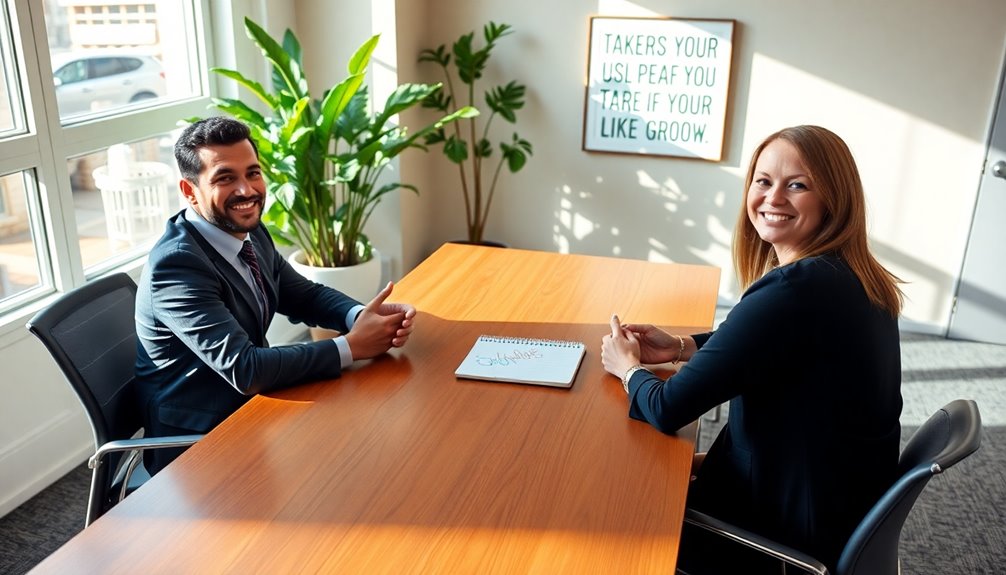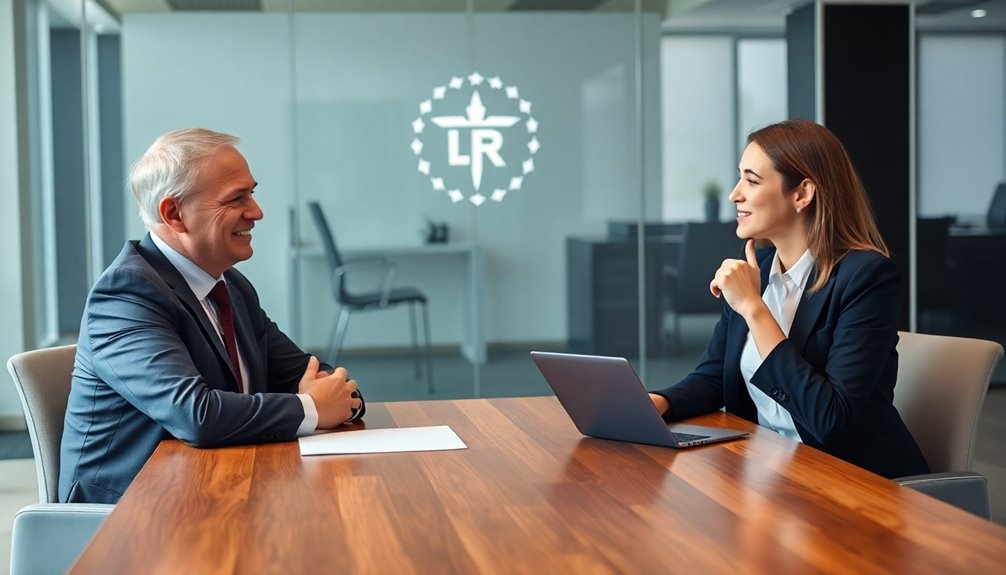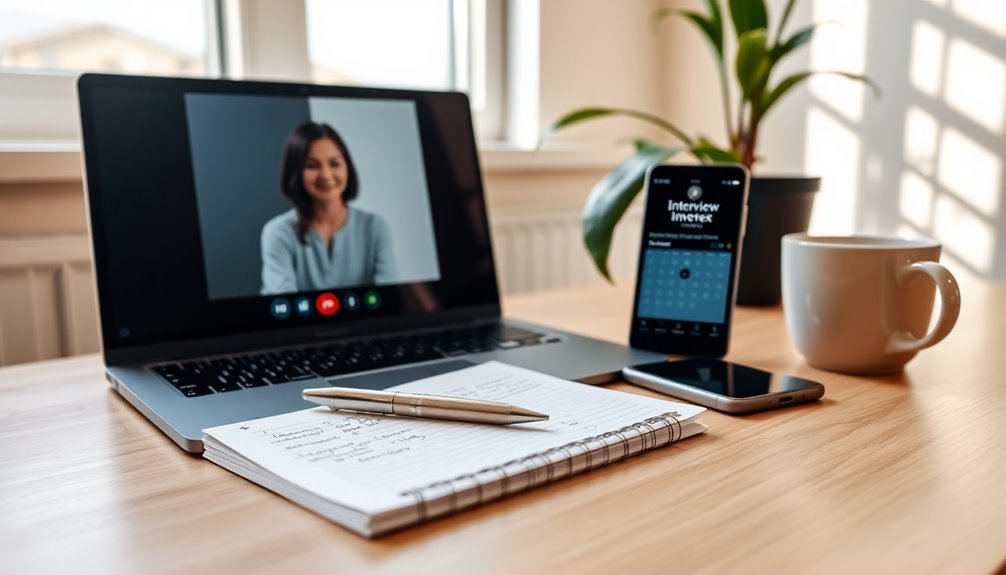A second interview often means you're on the right track, signaling strong interest from the employer. If the interview lasts longer than expected, that's a good sign. Pay attention to enthusiastic feedback and discussions about your role; this shows they're invested in you. Positive interactions with team members also suggest cultural fit. If they share insights about career growth opportunities, it indicates they envision you in their future. Finally, clear next steps from the interviewers reflect their commitment to you as a candidate. There's more to uncover about these signs, so keep exploring!
Key Takeaways
- A second interview often indicates strong employer interest and a desire to further evaluate your fit for the role.
- Extended discussions during the second interview reflect the employer's commitment to finding the right candidate.
- Positive feedback from interviewers, such as enthusiasm about your qualifications, suggests strong consideration for the position.
- Engaging conversations about salary and future projects indicate the employer's intent to advance in the hiring process.
- Clear next steps outlined post-interview signal genuine interest in your candidacy and a potential job offer.
Interview Duration Signals

When you're in a second interview, the duration can reveal a lot about the employer's interest in you. If the interview lasts longer than expected, that's often a positive sign. It usually means the interviewer's desire to explore your qualifications and fit for the role is strong. They might need a thorough evaluation to guarantee you're the right match for the job responsibilities and company culture.
Additionally, the length of the second interview often reflects the complexity of the position. A more involved role may require more time to discuss various aspects, indicating that they're serious about finding the right candidate. When discussions start to shift toward next steps in the hiring process, that's another clear signal it's positive. This shows they're considering you for the position and want to move forward.
Positive Team Interactions

During your second interview, pay attention to how team members engage with you. If they introduce themselves enthusiastically and invite you to share your thoughts, it's a strong sign they see you fitting into their dynamics. An office tour can also give you valuable insight into the culture and interactions that define the team.
Engaging Team Dynamics
Engaging team dynamics in a second interview can reveal a lot about a company's culture and how well you might fit in. When you meet team members, it's a strong indicator that the hiring manager sees potential in your candidacy. These engaging interactions signal that the organization values collaboration and is keen on evaluating candidate fit within the group.
If you're welcomed warmly during discussions, it reflects a positive company culture that prioritizes team cohesion. This atmosphere of support and encouragement shows that team dynamics are essential to their workplace culture. Furthermore, if you observe team members actively engaging with each other, it highlights a collaborative environment that fosters innovation and productivity.
Feedback from team members during the second interview can further enhance your appeal, suggesting the company is seriously considering you for the role. Ultimately, these signs of strong interest in your candidacy demonstrate the importance they place on creating a harmonious work environment. If you experience these positive interactions, it's a promising signal that you could thrive in their team dynamics.
Office Tour Experience
An office tour can be a revealing moment in the interview process, often highlighting strong candidate potential. During the tour, you'll meet enthusiastic team members who can give you insight into the company culture and team dynamics. Positive interactions with these employees indicate a collaborative environment, suggesting that you'll fit in well if hired.
Additionally, discussing the team's projects and goals during your tour is a strong sign the hiring manager is invested in showcasing the workplace. This not only helps you understand your potential contributions but also reinforces the idea that the team values engagement and satisfaction among its members.
Here's a quick overview of what to look for during your office tour:
| Positive Signs | What They Indicate |
|---|---|
| Enthusiastic team members | Supportive company culture |
| Positive interactions | Collaboration and communication valued |
| Engagement in discussions | Investment in employee satisfaction |
| Insight into projects/goals | Understanding of your potential role |
| Team dynamics observation | Good cultural fit and integration potential |
Cultural Fit Assessment
While you navigate the second interview, positive team interactions can be a strong indicator of your potential cultural fit within the organization. When you're introduced to multiple team members, it shows the company's interest in evaluating your cultural alignment with their values. Engaging discussions with future colleagues reveal insights into team dynamics and the type of work environment you might encounter.
Pay attention to the positive body language of team members; smiles and nodding can signal their enthusiasm about the possibility of you joining their team. If interviewers ask specific questions about your working style and values, they're likely considering how well you align with the company's culture and ethos.
An office tour or casual interactions with staff further emphasize that the employer values mutual compatibility. These moments allow you to gauge whether you can see yourself thriving in that environment. Overall, if you feel a sense of connection and camaraderie during these interactions, it's a promising sign that you might just be the right fit for the team. Embrace these opportunities to showcase your personality and values, as they can greatly influence the hiring decision.
Insightful Role Information

When the employer clearly outlines job responsibilities during your second interview, it's a strong sign they see potential in you. If they also share insights about the company culture and discuss organizational goals, it shows they're interested in your long-term fit. This kind of detailed conversation means they value your engagement and are considering you seriously for the role.
Job Responsibilities Explained Clearly
Clarity in job responsibilities during an interview signals an employer's genuine investment in finding the right candidate. When interviewers provide detailed explanations of the role, they demonstrate their commitment to ensuring you understand what's expected. This is a positive sign that they envision you integrating successfully into the team.
By discussing specific tasks and projects associated with the job, you can assess how your skills and experience align with the company's goals. Clear discussions about job responsibilities indicate transparency, allowing you to gauge how well you fit within the organization and its culture.
Moreover, when interviewers share examples of day-to-day activities, it reflects their belief in your potential to fulfill those responsibilities effectively. This breadth of information not only helps clarify what success looks like but also shows an investment in your long-term career satisfaction. In a similar way to how clear communication enhances relationships in parenting, understanding your role can lead to a more fulfilling work experience.
Ultimately, if you leave the interview with a thorough understanding of the job responsibilities, it enhances your ability to evaluate whether this opportunity aligns with your aspirations and values. Recognizing these signs can empower you to make informed decisions about your future.
Company Culture Insights Shared
Understanding company culture is essential for determining if a workplace aligns with your values and work style. During your second interview, if the interviewer shares specific examples of team dynamics and collaboration, it's a great sign. This indicates a positive workplace where support and teamwork thrive.
When discussions include the company's diversity and inclusion initiatives, it reflects a commitment to a respectful and equitable environment. If you hear about employee engagement programs or social activities, it suggests that the organization prioritizes well-being and community building.
Insight into professional development opportunities, like mentorship programs or training sessions, shows the company values your growth and career advancement. If the interviewer highlights employee testimonials or success stories, it demonstrates transparency and pride in their workforce, reinforcing a positive cultural fit.
These insights provide a clearer picture of the company culture, helping you assess how well it aligns with your expectations. A supportive, engaging environment is vital for your success and satisfaction, so pay attention to these cultural indicators in your second interview. Additionally, learning about the organization's commitment to employee well-being can indicate a healthy work-life balance and a focus on mental health support.
Organizational Goals Discussed Thoroughly
A thorough exploration into organizational goals during your second interview often signals the company's dedication to aligning new hires with its strategic vision. When employers discuss these goals in detail, it reflects their commitment to ensuring you understand how your role contributes to their long-term objectives. Here are some key indicators to watch for:
- Clear Role Contributions: If the interviewer outlines how your position supports organizational goals, it shows they value your potential impact.
- Engagement with Projects: Conversations about specific initiatives indicate a positive assessment of your candidate fit and the importance of your contributions.
- Future Objectives: When they discuss upcoming goals and how you can help achieve them, it suggests confidence in your ability to drive results.
- Values Alignment: Insightful discussions about the company's direction and values can reveal how closely your aspirations align with their mission, enhancing the likelihood of a job offer. Additionally, open communication about shared responsibilities can further demonstrate their interest in fostering a collaborative work environment.
Enthusiastic Interviewer Feedback

When interviewers express enthusiastic feedback, it often signals their genuine interest in you as a candidate. This feedback can take many forms, such as praise for your qualifications or excitement about your potential contributions. Positive reinforcement indicates they see you as a good fit for the role, and it can greatly boost your confidence.
Look out for future-oriented language, like when they discuss your responsibilities with phrases such as "when you join us." This reflects their confidence in your candidacy. Engaging discussions about salary expectations or benefits also suggest they're keen on moving forward with you.
Additionally, if you're invited to meet with additional team members, it often indicates a strong likelihood of advancing in the hiring process. Here's a quick summary of what to notice:
| Signs of Enthusiastic Feedback | Explanation |
|---|---|
| Praise for Qualifications | Indicates strong interest in your fit |
| Future-Oriented Language | Shows confidence in your candidacy |
| Engaging Discussions on Salary | Suggests intent to move forward |
| Meeting Additional Team Members | Highlights your potential fit |
These signs can confirm that you're a strong candidate for the position.
Career Growth Discussions

Discussing career growth opportunities in a second interview can be a strong indicator of your potential as a long-term asset to the company. When employers bring up topics related to career advancement, it shows they're invested in your future and see a positive outlook on your fit within the organization. Here are a few signs to look for:
- Potential Promotions: If they discuss possible career paths, it signifies they envision you growing with the company.
- Employee Development: Conversations about how they support training initiatives highlight their commitment to enhancing your skills.
- Mentorship Programs: An interest in mentorship indicates they value guidance and long-term professional growth.
- Success Cases: When they share stories of internal advancement, it reflects a culture that nurtures talent and celebrates achievements.
When interviewers ask about your career goals and how they align with the company's future projects, it signals a mutual interest in fostering your professional growth. These discussions make it clear that they're not just looking for someone to fill a role but for a candidate who can contribute to the company's success over time. Additionally, companies that prioritize employee development initiatives often attract top talent eager for advancement, reflecting a positive workplace culture.
Clear Next Steps

Clear next steps in the interview process signal the employer's genuine interest in you as a candidate. When an interviewer outlines these steps, it often means they're seriously considering you for the role. If they mention a second interview, that's a strong indication they want to further evaluate your fit within the team.
Additionally, if the hiring manager provides a timeline for feedback, it shows their commitment to keeping you informed about your progress. This level of detail reflects positive feedback and serious engagement from the interviewer, signaling that you're a priority in their selection process.
Moreover, if the discussions include encouragement for you to ask questions about the hiring process, it showcases their openness and positive outlook regarding your potential employment. This kind of interaction suggests that they value your input and want to guarantee you feel informed and comfortable moving forward.
Frequently Asked Questions
Does the 2nd Interview Mean I Got the Job?
A second interview doesn't guarantee you've got the job, but it typically shows that the employer's interested in you. They've likely seen potential in your qualifications and want to explore your fit further. If you're discussing job responsibilities and company culture, it's a good sign they're envisioning you in the role. Pay attention to their body language and questions about your availability, as these can indicate serious consideration.
How to Know if the 2nd Interview Went Well?
You know that feeling when you walk out of an interview, and it feels like you just aced a pop quiz? If you had engaging conversations, noticed positive body language from the interviewer, or were introduced to team members, those are strong signs it went well. Discussions about salary or phrases like "when you start" can also hint at their serious interest. Trust your instincts; they often know best!
What Are the Odds of Getting a Job Offer After the Second Interview?
The odds of getting a job offer after a second interview are generally quite favorable. You're likely among the top candidates, with chances often ranging from 50% to 70%. Employers use this stage to assess your fit more deeply, and if salary or start dates come up, it's a strong sign they're considering you seriously. Pay attention to their feedback; it usually indicates how well you align with their needs and culture.
What Is a Good Indication You Got the Job?
Did you know that nearly 60% of candidates who reach the second interview stage receive job offers? One good indication you've got the job is when the interviewer focuses on specifics about the role and team dynamics, suggesting they see you as a potential fit. If they start using phrases like "when you start" and discuss salary expectations, it's a clear sign they're seriously considering you for the position.
Conclusion
So, you've landed that second interview—congratulations! But don't start picking out your office plants just yet. Sure, the interview was long, and the team seemed to like your coffee preferences, but remember, they might just be desperate! Enthusiastic nods and career growth talks could just mean they're really good at pretending. Keep your excitement in check, because in the hiring game, it's all about playing hard to get. Good luck traversing the corporate jungle!









